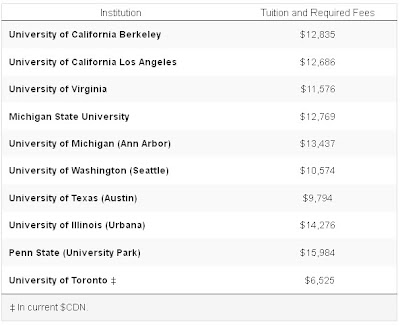The latest issue of Academic Matters has a provocative article by Ken Coates on The Quiet Campus: The Anatomy of Dissent at Canadian Universities.
Here's the opening paragraphs ...
Here's the opening paragraphs ...
The remarkable—a word that can be read in many different ways—2012 student protests in Quebec have stirred memories of the activist campuses of yesteryear. For faculty members introduced to the academy in the era of student activism, anti-Vietnam War protests, and general social unrest, the recent quietude of the Canadian university system has been disturbing. Universities had been transformed in the 1960s from comfortable retreats into agents of intellectual foment, social change, and political action. For a time, it appeared that the imperatives of the academy had aligned with a commitment to social justice to create a system almost ideally set to lead Canada’s transformation.I was a student in the 1960s. Universities are no longer like that. What happened?
Universities had long stood apart intellectually from the Canadian mainstream, but finally, in the 1960s, began to reflect society at large. The humanities and social sciences expanded rapidly. Women, minorities, immigrants and working class Canadians came to campuses in record numbers and, later, showed up at the front of the classroom. They brought new perspectives on the issues of the day, challenging the patriarchal, middle-class hegemony that had dominated Canadian universities for generations. With some exceptions, faculty members and administrators stood behind student radicals and protestors. Many faculty members used the classroom and their writing to support hitherto unpopular causes. Universities were often at the vanguard of protests against the Vietnam War and in favour of the rights of women, Aboriginals, LGBT individuals, and minorities.
Canadian campuses have become distressingly quiet. It is not that the universities are without dissenters from all points on political and social spectrums. Many of the country’s most radical, creative, and outspoken commentators work or study at universities and use the campus as a pulpit. This is how it should be. But the preoccupation with practicalities—work, careers, salaries, and the commercialization of research—has transformed Canadian universities into calm, largely dissent-free places, with the greatest debates often saved for battles between faculty and students and the campus administrators. There are no structural or legal impediments to greater engagement. There is nothing stopping students and faculty from speaking out, no grand tribunals determined to impose punishments on those who challenge the status quo. We have self-regulated ourselves into near silence, and our students and the country suffer from the quiet as much as university faculty. It is more than nostalgia that brings one to yearn for days of activism and protest; it is, instead, the realization that the ideas, talent, energy and resources of the academic could and should be used to change our country and our world for the better.Nostalgia, yes that describes my feelings exactly.


























